ENDOBS= Data Set Option
Specifies the end observation number in a user-defined
range of observations to be processed.
| Valid in: | DATA step and PROC step |
| Used by: | STARTOBS= data set option |
| Default: | the last observation in the data set |
| Restrictions: | use ENDOBS= with input data sets only
cannot be used with OBS= system and data set option or FIRSTOBS= system and data set option |
| Engine: | SPD Engine only |
Details
Specifying a Range of Observations
By default, the SPD
Engine processes all of the observations in the entire data set unless
you specify a range of observations with the STARTOBS= or ENDOBS=
options. If the STARTOBS= option is used without the ENDOBS= option,
the implied value of ENDOBS= is the end of the data set. When both
options are used together, the value of ENDOBS= must be greater than
the value of STARTOBS=.
Examples
Example 1: ENDOBS= with SPD Engine
A data set is created
and processed by the SPD Engine with ENDOBS=5 specified. The WHERE
expression is applied to the data set ending with observation number
5. The PRINT procedure prints four observations, which are the observations
qualified by the WHERE expression.
libname growth spde 'c:\SchoolAge'; data growth.teens; input Name $ Sex $ Age Height Weight; list; datalines; Alfred M 14 69.0 112.5 Carol F 14 62.8 102.5 James M 13 57.3 83.0 Janet F 15 62.5 112.5 Judy F 14 64.3 90.0 Philip M 16 72.0 150.0 Zeke M 14 71.1 105.0 Alice F 14 65.1 91.0 William M 15 66.5 112.0 ; proc print data=growth.teens (endobs=5); where age >13; title 'WHERE age > 13 using SPD Engine'; run;The output is shown:
Example 2: OBS= with SPD Engine
The same data set is
processed with OBS=5 specified. PROC PRINT prints five observations,
which are all of the observations qualified by the WHERE expression,
ending with the fifth qualified observation.
libname growth spde 'c:\SchoolAge'; data growth.teens; input Name $ Sex $ Age Height Weight; list; datalines; Alfred M 14 69.0 112.5 Carol F 14 62.8 102.5 James M 13 57.3 83.0 Janet F 15 62.5 112.5 Judy F 14 64.3 90.0 Philip M 16 72.0 150.0 Zeke M 14 71.1 105.1 Alice F 14 65.1 91.0 William M 15 66.5 112.0 ; proc print data=growth.teens (obs=5); where age >13; title 'WHERE age > 13 using V9'; run;

